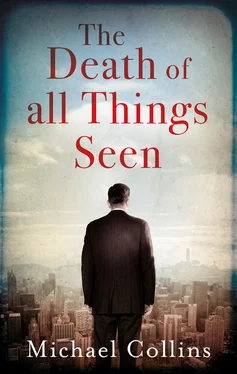Nate closed and opened his eyes, his thoughts landing on the awful circumstance of Walter Price’s suicide. He had given absolutely no thought to the man, to this cuckolded man. What a terrible word! “Cuckold!” that it even existed in a language, that it had a name.
Did Walter Price know it?
*
Another email arrived, a single word, Here!
It had been a mistake summoning Norman Price. It had troubled Ursula greatly that Nate had come upon the idea of approaching Norman. It was a betrayal to her, extending their natural union in death. She had settled like a bad conscience.
He whispered, ‘Sorry’ into the grey dark.
Nate let out a long breath. In light of what he now knew, the meeting seemed pointlessly hurtful. How could he explain the reels, when he had come upon them so recently, and he had yet to come to terms with something not yet fully understood?
He would not presume to assert any influence as a half-brother, or as a half-not-brother. They were bound, but not in a way that should be pushed upon either of them. There could be nothing gained. He had been rash and too mindful of his own circumstances, when there was Norman Price to consider.
At some point in the future, he would forward the reels to Norman and let him configure his own understanding. It was decided.
He sent a cursory email, abrupt but deferential, ending any chance of their meeting. ‘Regrettably, due to unanticipated circumstances, I am returned to Canada. I beg your forgiveness.’
Of course, Norman Price, if he wanted, could have checked the desk to see if Nate was checked out. In fact, a minute later, the phone in the room rang and rang.
Nate held his breath, waiting for it to stop, its insistence in his head, the shrill ring. Norman Price knew he was there.
A minute passed, then another, and then five minutes.
Nate heard voices and footsteps along the corridor. He sat staring at his father, the tape at the end of the reel, the last tape. He purposely played it last, this the day he died, the quiet meditation of a life coming to an end. It was different from the other reels. The date was written in his handwriting, not Helen Price’s.
His father had set up the tripod. He walked toward the camera and away, sat with a conscious stiffness that his destiny was decided, and had been for a long time. He did not look up or drink in the way he did on other occasions.
He put his signature to a series of letters or statements, the flourish of his hand raised at the end of signing his name. At a certain point, his father simply stood, and, adjusting his tie, he was then out of frame. A sheer curtain billowed a moment later, a ghost passing, his father gone to his death.
The reel went on a good while longer in his absence. Fifteen minutes or so, until it was uncovered, who had jumped, because there was no identifying the body from such a height, a search conducted floor-by-floor, until there was the frightful desperation on Helen Price’s face, her hand raised to her mouth, upon entering the office. She was caught staring at the camera, the absolute horror of it, the wide-eyed stare and her mouth open in an awful bawling that he heard in his head, when there was no recorded sound.
The phone rang again, a shrill ring from another era, the inherent alarm in the sound itself when a phone was never at arm’s length, and it took a breathless rush to reach it. It kept on ringing. Nate had his hands to his ears.
Norman Price had the tenacity to knock on the door. He called Nate’s name, and when he was done knocking, when Nate was sure, when the persistent shadow from under the door was gone, when he heard the elevator door open and close, he unplugged the projector, let the bulb cool.
Standing in the sudden dark, he lifted the projector for its dead weight, to know he still existed, to somehow anchor the present.
The test of a first-rate intelligence is the ability to hold two opposed ideas in the mind at the same time, and still retain the ability to function.
— F. SCOTT FITZGERALD
THERE WAS ACTIVITY on the house, as the realtor described it, a tentative cash offer by a family of Mexicans.
The outstanding issue not yet managed was their legal status. The family had been to the house three times already. There was nothing easy in real estate, and it was made more difficult in the tightening of credit. An intermediary, a legal immigrant, might front the offer. It was done within their community. The realtor sounded unsure. She had not worked with this community before.
Under better market conditions, the house might have been a starter home for a young couple, a law grad, accountant, a medical intern, those of upwardly mobile means, starting out, the house close to the commuter train. A house, until recently, meant equity in soaring market values, monopoly money, a recoup against unrealistic student debt and credit cards. Accommodation had been made within the system.
The projected tentative offer would be lowball, his realtor warned. They had a number in mind. He should be prepared to counter. He magnanimously declined. They were hardworking immigrants, and, if they could swing it, he wanted the deal closed.
Norman was in the post-shock of Nate Feldman’s retreat, in Nate’s decision not to meet. Something had been decided at the last minute. He couldn’t figure what it was that so suddenly changed. It mattered, and did not matter. His life was elsewhere.
The realtor called on a daily basis. It was the new preoccupation, the new distraction. Life had a way of intervening. The family wanted relatives to do another walk-through before making their offer. The realtor advised of further rumblings. He should brace for an even lower offer, or they might want a land agreement option, a variant of renting with an option to buy.
Something dropped in the pit of Norman’s stomach. The house might not close. If these buyers walked, he was looking at a mounting investment of retrofits if he was going to compete in a buyer’s market, when a house might now be lived in for a very long time. His only solace, he held no note on the house. The question was put two ways: How much was he willing to lose in a sale, or how little was he hoping to gain?
*
Joanne arrived bare-footed and unannounced before Norman’s office door on the morning they had a car rented again from Alamo to visit his home in the suburbs. It was still dark, but there was shading in the East, the days lengthening. Spring was in the air.
Joanne asked quietly, ‘You were up all night writing?’
Norman nodded. He didn’t take the opportunity to explain. He said, in an almost whisper, in deference to Grace sleeping, ‘I might write for an hour.’
Joanne was turned and gone into the kitchen. She poured coffee. She repeated the minivan pickup time — 11.30. She was back at his office door, her chin set on the lip of the cup. A minute later, she slipped along the hallway. She was on a hideaway bed, in with Grace. The conceit of the tent had passed. She was here more permanently, but it was yet decided how they might fare. It fell under the category, Platonic.
In the quiet indecision, Norman looked at the box from Mr Ahmet. There were files on all four of the officers related to the gangland-style murders. Each officer had his own personality, his own history, but Mr Ahmet centered in Norman’s mind. He had a chart on the wall, the intersecting histories, the birth records and marriage records of the varying characters, their ethnic origins. Mr Ahmet was the outside perspective that might better comment and understand what needed to be explored and explained. All points of inquiry went through him, what could be known ostensibly, within the bounds of reason. The legal brief, the officious nature of his position, might allow Norman to exercise a variety of voices. He had a working title, ‘A Grand Indictment’.
Читать дальше












